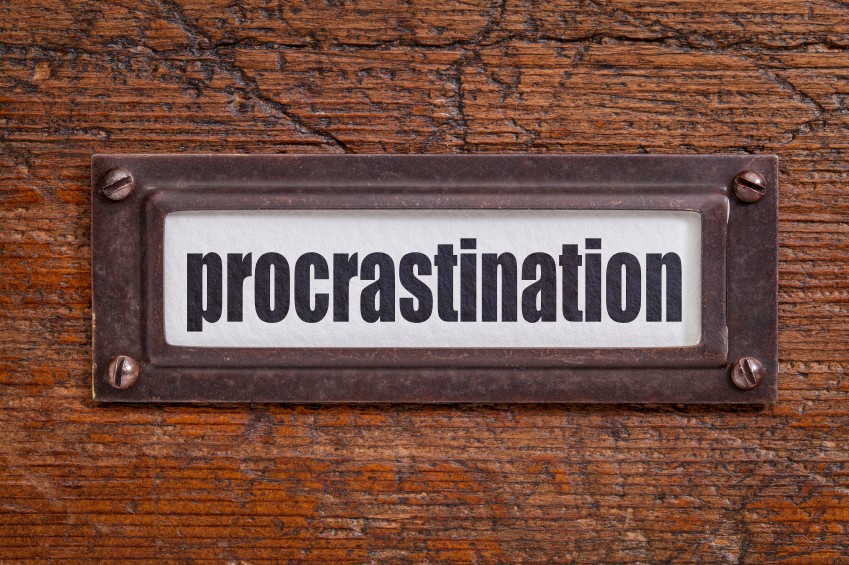
The sign is a clue to what a recent article in the Trusts & Estate section of WealthManagement.com identifies as a trend away from estate planning and, therefore, toward more probating of estates. (The Shift from Estate Planning to Estate Probating)
In other words, the author believes the national trend indicates a penchant for putting off doing estate planning. The author’s predicts that the aging population combined with the current estate planning trend (or lack thereof) will lead to more “estate probating” (more probate estates), and that means more cost and more difficulties for the people who survive. It is the old “you can pay me now or pay me later” adage.
The author opines that a majority of Americans do not plan because they are not aware why they should plan their estates.
I do not know about any trends, and I have not done any surveys, but I am very aware of the statistics that a majority of Americans have not done any estate planning. I have also seen in my own practice that much of the estate planning that has been done is cursory and incomplete.
Interestingly, a survey that was the impetus for the article indicates the following top three reasons why people do estate planning:
- To avoid probate (59%);
- To minimize discord among beneficiaries (57%); and
- Protect children from mismanaging their inheritance (39%).
My assessment is mainly anecdotal but I would say that most people who come to me for estate planning are less specific about why they should be doing their estate planning. They just know they should do it. They know they should put their estate in order, but they are not exactly sure why. In that sense, I agree with the author that a general lack of understanding exists.
The author highlights that a majority of people do estate planning to avoid probate, but fewer people are actually doing something to avoid probate. In my own practice, I see people who have a vague idea that estate planning should be done to avoid probate, but they really do not know what that means.
My philosophy in doing estate planning is to inform my clients, fill in the gaps in their understanding and knowledge, and let them tell me what they want to do. I do not tell them what they should do. When I explain that a Will does not avoid probate, and explain the differences between Wills and Trusts, I am surprised that many of my clients still choose to do only a Will (rather than a Trust), even knowing that the estate will be subject to the probate process.
Using Trusts, of course, costs more. Trusts might cost a third to a half more for the estate planning than just a Will. Trusts also involve more effort by the client. Once a Trust is established, the client must follow through to transfer the client’s assets into the Trust. I can only conclude that the combination of higher cost and greater effort is what leads people to choose Wills, rather than Trusts, even knowing that their estates will need to be probated.
Perhaps that is a sign of the times. Though political voices on both sides of the aisle weave different stories about the state of the economy and whether Americans are better off now than they were in the past, I see people cautious to spend money. People are also busy in their lives, and adding extra work is not high on an overfilled agenda.
In the article, the author notes that a person’s view of the benefit of avoiding probate often changes after experiencing the probate process first hand. That is especially true when a parent or other loved one dies without having done any estate planning. The uncertainties about what is required, where to start, who will pay for it and a thousand questions leave loved ones left picking up the pieces in a high state of anxiety. I have had clients say, “I do not want to do that to my children.” The article suggests, “Ultimately, the probate versus planning pendulum will shift back to planning, as more clients who were refugees from the probate process engage in proactive planning.”
My crystal ball is a little cloudy, but I do see a need for education and awareness. A client recently came to me when a neighbor and fellow church goer passed. This person (the decedent) lived a very simple and frugal life. Friends and neighbors urged the decedent to put her affairs in order, but she brushed them off. When she died, she left quite a mess.
She had no immediate family. No one knew the extent of her assets or sources of income. She rented the houses she lived and died in. With no plan and no one identified by her to handle her estate, the landlord was unable to re-rent the house for months while people scrambled to figure out what to do. The funeral home held her body because there was no one to claim it and no one to pay the expenses. Social security checks kept coming because there was no one to notify them of the death. The lack of planning caused a great deal of expense, delay, inconvenience and difficulty for many people, including the funeral home, the landlord, the post office, social security, utility companies, a credit card company, and ultimately, her friends and neighbors.
When people do not do any estate planning or do only incomplete estate planning, they leave a mess for the people who survive them. Even small estates have many loose ends that need to be tied up.
Estate planning is the last gift you make to the people who survive you. Doing your estate planning and putting your estate in order is an act of compassion.
The best gift you can leave for your loved ones is a well-planned estate that is set up to avoid the long and costly probate process. While leaving assets in a combination of joint tenancy, payable on death and beneficiary combinations can avoid probate, it is a very limited estate plan and only works if the joint tenants and beneficiaries survive you in the order that you have listed them. Even then, you still need a Will for assets for which there is no joint tenancy or beneficiary designations.
A Trust, however, is the best and most complete form of estate planning that you can do. A trust provides maximum control for all of the “what ifs”. It allows you to nuance your estate planning to provide for any number of unique situations and needs. A Trust is the best and most comprehensive way to avoid probate. A Trust provides a seamless transition from you during your life to your loved ones after death without the court or attorneys involved. Of course, you might seek an attorney’s advice for this or that, but Trust administration is private and does not involve the court and, therefore, does not require the involvement of attorneys.
You will save much more than the additional cost of preparing a Trust in probate and attorneys’ fees that are not needed. You will also save your loved ones a great deal of time, expense and headache by leaving your assets in a Trust that you set up during your life. Survivors need time to grieve and deal with your loss; if you have put your estate in order and planned for a smooth, seamless transition with a Trust, you will protect them from the added anxiety, stress and difficulty of having to go through the probate process.
You can take control of your estate by doing estate planning with either a Will or a Trust, but the best estate planning that will provide the most benefit for your loved ones is a Trust. My advice is to buck the trend and start planning your estate today. Your family and friends will appreciate you all the more.
 Kevin G. Drendel
Drendel & Jansons Law Group
111 Flinn Street
Batavia, IL 60510
630-523-0543
630-406-6179 fax
[email protected]
www.batavialaw.com
Kevin G. Drendel
Drendel & Jansons Law Group
111 Flinn Street
Batavia, IL 60510
630-523-0543
630-406-6179 fax
[email protected]
www.batavialaw.com
*****************************************************************************
Follow the links for more articles on estate administration and estate planning and legal updates.

If you need immediate help with an estate, estate planning or other matters, contact us.
